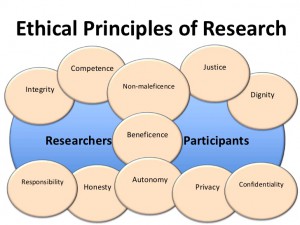 Do you know that there is something that you might forget while writing your thesis? Stop wondering on what that is! It is ethics that have to be followed when performing research at any level of graduation. Well, in this section we shall understand why research ethics is important to research and the various principles involved in it.
Do you know that there is something that you might forget while writing your thesis? Stop wondering on what that is! It is ethics that have to be followed when performing research at any level of graduation. Well, in this section we shall understand why research ethics is important to research and the various principles involved in it.
To start off, the ethical principles should be beneficial to the researcher and people who read it and do no harm or non malfeasance. However, in practice these ethical principles imply that as a researcher one needs to get a written consent from the participants, reduce the risk of harm to the participants, safeguard the confidentiality and anonymity of the respondents, completely avoid the use of deceptive practices and finally give the participants the right to withdraw from the research at any point of time if they are not interested.
Basic Ethical Principles:
Some researchers may feel they can do this ethics part later and tend to forget them at the last moment. On the contrary, there are some cases the participants fail to give their consent as they fear disastrous consequences.
Additionally, these research principles tend to vary across different countries, but their basic aim is to be beneficial to people and at the same time avoid harming anyone. The failure to follow ethical pricniples may result in the dissertation being criticized or rejected by the supervisor or Ethics committee.
Five Principles of Ethics:
What are the five principles of ethics that are to be followed by every researcher?
These basic principles are that the research should not harm participants, when there is a chance of harming them or placing them in a discomforting position. In this case, additional planning must be kept as a backup or more precautions have to be taken. The second principle is the protection of anonymity and the information provided by the participants, because it is mandatory for the participants to be willing to reveal information that is secretive or personal in nature. The third principle is to completely avoid deceit or deceptive practices that are completely unethical in nature. The fourth principle is to always obtain informed consent from the participants and this principle ensures that they understand the objective of the research and what the research demands out of them. The final principle is to give the rights of withdrawal to the participants.
We, at Express Dissertation give you professional advice as to how the research can be performed along with following the basic research principles. We also have a good team of professionals who can suggest what has to be done and not to be done when following ethical principles in research.
